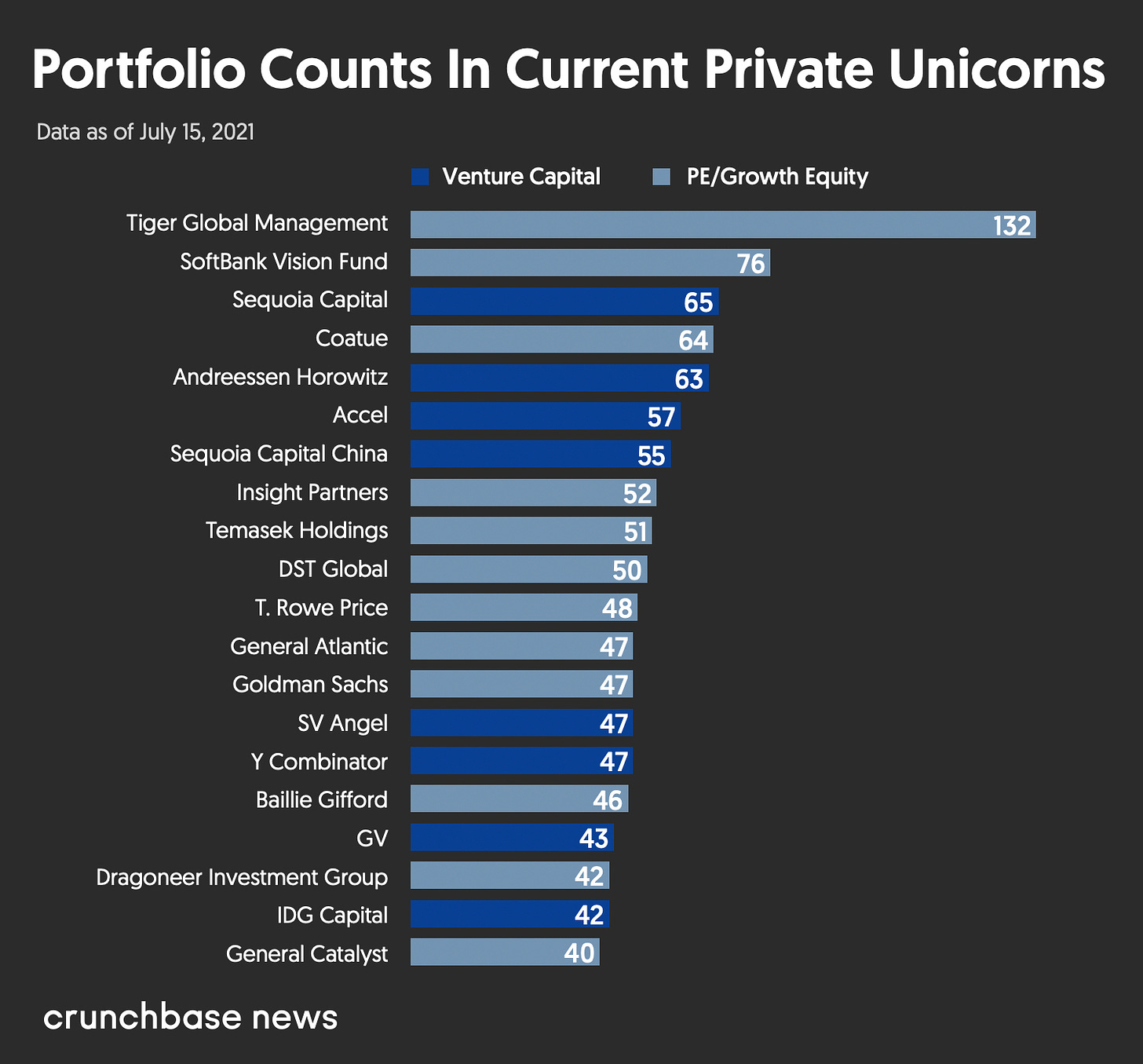The way you pay won’t be the same
Also in today's edition: SoftBank's Didi bet shrinks, a magic Covid cure, and Tesla in India?
Good morning! If there is a WhatsApp group where all of Byju's acquisitions hang out, we want an invite because the education mammoth acquired Toppr and Great Learning in a deal worth $600 million in cash and stock. Curiously, Great Learning was bootstrapped and all the exit bonanza goes to the founders. That's a lesson.
Anyway, on to the day's stories:
How do you like them apples?
China's ed-tech massacre isn't a laughing matter.
There are too many unicorns here.
Bloodbath in Chinese Ed-tech
Back in May, we told you that something (read, a crackdown) was brewing in China’s red-hot ed-tech sector. Well, that came to fruition over the weekend.
A government body has ordered ed-tech and private tutoring companies that “offer tutoring on school curriculum to go non-profit,” Bloomberg reported. The sector is valued at $100 billion. The move not only bars their making profits but also raising capital and listing on public markets. US and Hong Kong-listed ed-tech firms’ stocks plunged dramatically.
But why? There are two possible reasons for this move, according to SupChina. One, it is part of Beijing's "sweeping antitrust campaign", and two, specifically, reinforces a stated national objective: improve birth rates. High private tutoring fees are a burden on middle-class families, discouraging them from having children. Go deeper with this Twitter thread.
Investors jittery: Foreign funds such as Tiger, SoftBank, and Temasek, which have poured millions into leading ed-tech firms, have been singed. Their exit doors have been slammed shut.
Digital Rupee Is Closer Than Ever Before
The Reserve Bank of India plans to launch a full-scale central bank digital currency (CBDC) in multiple phases, according to RBI deputy governor T Rabi Shankar.
What’s CBDC? It’s currency that is issued by central banks but only electronically. Unlike private digital currencies like Bitcoin and Ethereum, which solely depend on users’ trust, CBDCs are backed by the issuing central bank’s balance sheet.
Global game: About 80 countries are developing CBDCs. China has already launched its digital yuan, which some believe could be a threat to the dollar’s international dominance. In the unlikely event of the digital yuan unseating the dollar as the world’s reserve currency, we will be looking at a very different global economic order.
India Enters Crypto 2.0
It is certainly not the first, but Delhi-based home décor company The Rug Republic is perhaps the only one to accept payments in 20 top cryptocurrencies. It’s a calculated risk that could pay off in the long term, its director Raghav Gupta told the Economic Times. It’s akin to accepting payment in gold in the hope its value will rise.
All good: While The Rug Republic won’t be accepting cross-border payments to avoid running into foreign exchange rules, companies such as Coca-Cola, Tesla, Microsoft, and Axa Insurance abroad are keen on crypto payments. Even Amazon is mulling it. One country, El Salvador, has made Bitcoin legal tender while some others are considering it.
Miners ahoy: Meanwhile, platforms in India are hiring engineers to mine cryptocurrencies, particularly Bitcoin. Hiring consultants told Moneycontrol that candidates for roles like blockchain developer, backend developer, and crypto engineer are in high demand and are commanding salaries 25-30% higher than regular IT jobs.
The Signal
When cryptocurrencies started gaining currency in India some years ago, the Reserve Bank of India’s first response was to shut them out altogether. The Supreme Court, however, struck down the outright ban. They are now in a legal limbo and exchanges often find themselves accosted by enforcement agencies. Although comprehensive legislation has been in the works, lawmakers will not consider it in the Parliament session currently underway. That has not diminished interest in the tokens. Quite the contrary, increasing acceptance abroad and their rising value has only fueled enthusiasm in India. That may persuade the government to frame a forward-looking governance structure rather than risk pushing the market underground.
Too cold for coffee, too hot for apples
Extreme weather is laying waste crops across the world and making food costlier.
Cold coffee: For the first time since 2014, the price of coffee has gone to $2 per pound, a 17% hike in the week. Trees in Brazil, the world’s largest producer of the bean, are bitten by the worst frost in two decades.
Too hot for fruits: Elsewhere, such as the US and Canada, blistering heat and droughts have destroyed standing crops. The fierce sun has burnt Washington apples and California grapes. In Europe, grains are at risk of fungal diseases because of incessant rains. Even fish have fewer micronutrients now because of climate change impacts.
Too little for everyone: Some studies predict that crop yields could reduce by 10% by 2050, and 25% by the end of the century due to heat. India has had four bountiful harvests since 2019 which have helped keep domestic food prices calm despite international inflation. Global shortages could, however, put pressure on prices of certain imported items such as cooking oil and pulses.
Unicorns Multiply Like Rabbits
The collective valuation of unicorns — companies held privately and valued at over $1 billion, is now $3 trillion according to Crunchbase. The stable, made up of over 900 firms, has increased around 50% in value over the past year, with 400 joining the club and over 100 making an exit. Tiger Global, SoftBank, and Sequoia have the most under their respective banners.
What Else Made The Signal?
In the red: Softbank Vision Fund’s $11.8 billion bet on Chinese ride-hailing company Didi Chuxing has shrunk to $7.8 billion following regulatory action against it for alleged data security lapses.
Communal boom: Social commerce startups have made $554 million this year as of July 16, 2021, the highest since 2015 and a 7x increase from last year.
Flood fury: Even as it tries to prevent another wave of Covid-19 infections, Maharashtra has been hit by torrential rains and floods that have cut off villages and killed 138 people.
Jazzy growth: Popular social media icons have a good year coming with influencer marketing spending in the US expected to grow 30% to exceed $3 billion in 2021.
T for tariffs: Elon Musk has said his company might set up a factory in India if it first lowers tariffs and begins importing Tesla cars.
Get robotic: Alphabet, Google’s parent company, is launching Intrinsic, a company that will build software for industrial robots.
Japanese cure: Japanese drugmaker Shionogi & Co has begun human trials for a Covid-19 once-a-day pill for infected patients.
Fun Signals
Boy band diplomacy: Wildly popular South Korean boyband BTS will now be diplomats at conferences such as the 76th United Nations General Assembly. Korea hopes BTS lending its voice would help solve global challenges such as environmental issues and inequality.
Pizza bonanza: The best way to win free pizzas for life? Win an Olympic medal. Domino’s Pizza is giving Indian weightlifter Mirabai Chanu free pizzas for life after she won the country its first medal in the 2020 Tokyo Olympics.
Woof drink: Feel like your pooch is left out when you step out for a drink? A bar in London is offering drinks like Bloodhound Mary or Barkarita to dogs who accompany their parents out for the night.








